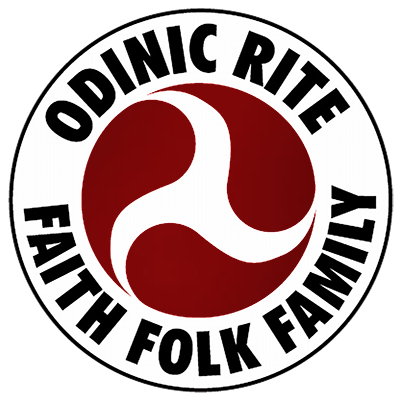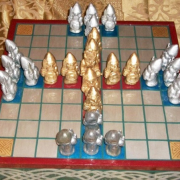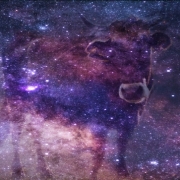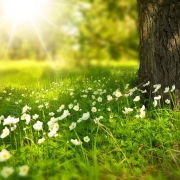Heimdal
The Gods and Goddesses of Odinism
Copyright © 1996 The Circle of Ostara
Published with the kind permission of the Circle of Ostara.
This article must not be republished or reprinted
in whole or in part without their express written permission.
And yet it is in another role that this mighty and shining figure is of greatest significance to us as a people, for of all the gods it is Heimdal alone who is said to have lived among men in Midgarth and to have lived among us as a man himself.
After the creation of Ask and Embla as the first of our race, our folk lived simple lives, innocent of evil or violence, for many long millenia through the spring of the Golden Age. And yet a cloud appeared, far away, a portent of suffering although it was seen by none except the gods themselves. And so Heimdal was sent to us with the gift of culture, that we should have the power to protect ourselves from the evil that would some day come.
He was manifested in the form of a child and prepared and educated by nine sea-mothers, the fair and powerful daughters of Ran. And one day our people, living on the shores of the primal country, saw across the tossing waves a boat approaching and on the boat a gleaming child surrounded by treasures, by tools and weapons and a golden sheaf of grain. The people took him from the boat and treated him lovingly and called him Scef, after the sheaf of grain.
At that time our folk lived on the bounties of nature. They had no fire and knew nothing of spinning or weaving or agriculture nor any craft save life itself. But when he was grown, Scef-Heimdal taught them all these things. He lived for many lives of men and wandered across the country from town to village to farmstead and everywhere found welcome. He visited the cottage of the thrall, the house of the karl, and the hall of the jarl, and in each place co-fathered a child. In this he is seen as the first patriarch, the divine progenitor of these three social divisions. So it is said that all of our race are the descendants of Heimdal. Tales begin, “Now gather round, ye children of Heimdal, great and small…”
Now it happened – or so the tales tell us – that Heimdal returned to the realm of the gods and there loved and won a divine maid. Her name was Alf-Hilda, a shining Sun-Dis as fair and radiant as a summer morning. But the years passed and in Midgarth the Golden Age in its Great Summer drew towards its close. And Alf-Hilda, Maid of the Sun, grew angry and fretful and fled away to the far north where she lived in a secret place. All the Earth grew cold when she was gone and the folk of Midgarth shivered and heaped up their fires and looked with dread upon the withered grass and falling leaves. Loud they called to Heimdal, their father of old, for help and confort.
He heard them in his home in shining Helas, where he sighed for the loss of his darling, and their cries aroused his anger. Away he rode on his shining horse to the far north and there, in a secret hollow, he saw her hall, where she sat sulking alone. Dank it was and cold. Two great dragons guarded the door, breathing forth mist and frost, and their names were Shivering Cold and Biting Ice. They sprang up in fury as the hero drew near and in Midgarth the ground froze hard as iron and great wild blizzards drove across the land. Men shivered and drew close to their fires. But Heimdal, with his gleaming sword, slew both the dragons straight away and catching up his errant love rode home again in triumph. In her heart she was glad enough to see him… And so the Earth grew warm again.
We are told that this story is a mythic resonance, echoing in the racial memory, of a time when the ice came down and then retreated before the setting in of the Ice Age proper, when for many long lives of men King Frodi ruled in Midgarth.
In Midgarth now we feel a cold that binds us, a chill of the spirit, and we invoke Heimdal to aid us:
- Heimdal, shining one, father of old
Send us your cleansing fire.
Let its flame blaze up in the soul of our folk
And rouse us to a bright rebirth!


 Hengest Thorsson
Hengest Thorsson